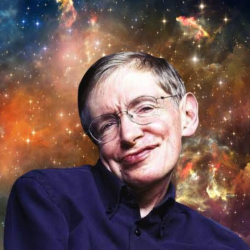
Stephen Hawking
| Date of Birth | : | 08 Jan, 1942 |
| Date of Death | : | 14 May, 2018 |
| Place of Birth | : | Oxford, United Kingdom |
| Profession | : | Author, Educationalist, Cosmologist |
| Nationality | : | British, English |
Stephen Hawking English theoretical physicist whose theory of exploding black holes drew upon both relativity theory and quantum mechanics. He also worked with space-time singularities.
Personal Life
Hawking was born on 8 January 1942 in Oxford to Frank and Isobel Eileen Hawking (née Walker). Hawking's mother was born into a family of doctors in Glasgow, Scotland. His wealthy paternal great-grandfather, from Yorkshire, over-extended himself buying farm land and then went bankrupt in the great agricultural depression during the early 20th century. His paternal great-grandmother saved the family from financial ruin by opening a school in their home. Despite their families' financial constraints, both parents attended the University of Oxford, where Frank read medicine and Isobel read Philosophy, Politics and Economics. Isobel worked as a secretary for a medical research institute, and Frank was a medical researcher. Hawking had two younger sisters, Philippa and Mary, and an adopted brother, Edward Frank David (1955–2003).
In 1950, when Hawking's father became head of the division of parasitology at the National Institute for Medical Research, the family moved to St Albans, Hertfordshire. In St Albans, the family was considered highly intelligent and somewhat eccentric; meals were often spent with each person silently reading a book. They lived a frugal existence in a large, cluttered, and poorly maintained house and travelled in a converted London taxicab. During one of Hawking's father's frequent absences working in Africa, the rest of the family spent four months in Mallorca visiting his mother's friend Beryl and her husband, the poet Robert Graves.
Biography
Hawking studied physics at University College, Oxford (B.A., 1962), and Trinity Hall, Cambridge (Ph.D., 1966). He was elected a research fellow at Gonville and Caius College at Cambridge. In the early 1960s Hawking contracted amyotrophic lateral sclerosis, an incurable degenerative neuromuscular disease. He continued to work despite the disease’s progressively disabling effects.
Hawking worked primarily in the field of general relativity and particularly on the physics of black holes. In 1971 he suggested the formation, following the big bang, of numerous objects containing as much as one billion tons of mass but occupying only the space of a proton. These objects, called mini black holes, are unique in that their immense mass and gravity require that they be ruled by the laws of relativity, while their minute size requires that the laws of quantum mechanics apply to them also. In 1974 Hawking proposed that, in accordance with the predictions of quantum theory, black holes emit subatomic particles until they exhaust their energy and finally explode. Hawking’s work greatly spurred efforts to theoretically delineate the properties of black holes, objects about which it was previously thought that nothing could be known. His work was also important because it showed these properties’ relationship to the laws of classical thermodynamics and quantum mechanics.
Hawking’s contributions to physics earned him many exceptional honours. In 1974 the Royal Society elected him one of its youngest fellows. He became professor of gravitational physics at Cambridge in 1977, and in 1979 he was appointed to Cambridge’s Lucasian professorship of mathematics, a post once held by Isaac Newton. Hawking was made a Commander of the Order of the British Empire (CBE) in 1982 and a Companion of Honour in 1989. He also received the Copley Medal from the Royal Society in 2006 and the U.S. Presidential Medal of Freedom in 2009. In 2008 he accepted a visiting research chair at the Perimeter Institute for Theoretical Physics in Waterloo, Ontario, Canada.
His publications included The Large Scale Structure of Space-Time (1973; coauthored with G.F.R. Ellis), Superspace and Supergravity (1981), The Very Early Universe (1983), and the best sellers A Brief History of Time: From the Big Bang to Black Holes (1988), The Universe in a Nutshell (2001), A Briefer History of Time (2005), and The Grand Design (2010; coauthored with Leonard Mlodinow).
Death
Hawking died at his home in Cambridge on 14 March 2018, at the age of 76. His family stated that he "died peacefully". He was eulogised by figures in science, entertainment, politics, and other areas.The Gonville and Caius College flag flew at half-mast and a book of condolences was signed by students and visitors. A tribute was made to Hawking in the closing speech by IPC President Andrew Parsons at the closing ceremony of the 2018 Paralympic Winter Games in Pyeongchang, South Korea.
Quotes
So remember to look up at the stars and not down at your feet. Try to make sense of what you see and hold on to that childlike wonder about what makes the universe exist.
We are very, very small, but we are profoundly capable of very, very big things.
Intelligence is the ability to adapt to change.
Quiet people have the loudest minds.
The thing about smart people is that they seem like crazy people to dumb people.
However difficult life may seem, there is always something you can do and succeed at.
I have noticed even people who claim everything is predestined, and that we can do nothing to change it, look before they cross the road.
One of the basic rules of the universe is that nothing is perfect. Perfection simply doesn't exist.....Without imperfection, neither you nor I would exist
It is all right to make mistakes; nothing is perfect because with perfection, we would not exist.
It is very important for young people keep their sense of wonder and keep asking why.
